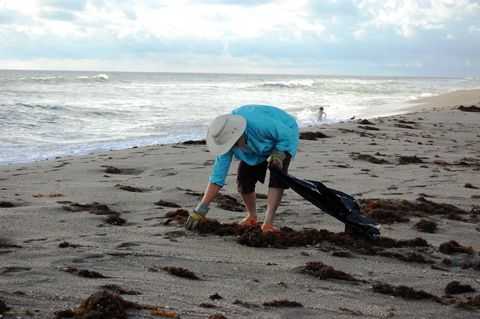By Ellie Van Os
I recently bought a book on the origins of sea glass. Having collected many pieces over the years, along with other edge-of-the-sea artifacts, it caught my attention. Collecting glass has always been relaxing, particularly because I don’t obsess about identifying and cataloging like I do with everything else. Inadvertently, the book woke me up and made me think about the big picture, that those diminishing sea glass gems are evidence of a major change in the way we do things on this planet.
Sea glass, refuse from the past, was never the focus of a beach trip, merely a pleasant surprise. It was brown or green, best smooth, and I knew that a piece of blue glass was special. But glass has been used for thousands of years by civilizations all over the world. It is becoming rarer as a result of a combination of things: worldwide increases in glass recycling, more interest in collecting, and most ominously, more plastics. Except for beer brewers and their commitment to glass for superior taste, the bottlers of soda, medicine, milk and countless other food products have moved away from using glass.

“I just want to say one word to you, just one word….plastics.” The voice was that of Mr. McGuire, the year was 1967 and the movie was The Graduate. Ground-breaking on so many fronts, that line even then seemed to foretell a major change in something, even though I was too young to understand what it was. Essentially Mr. McGuire predicted a societal shift from glass products made from inorganic materials like silica to the advanced polymer science of its lightweight and resistant-todegradation successor, plastic. When I look back now I realize that I lived through these major changes, exemplified by memories of our milk man in the early 60’s changing to milk jugs at the store, from cardboard boxes to hard plastic ‘clamshell’ packaging, from glass soda bottles to plastic soda bottles and from brown paper bags to plastic grocery bags.
The unfortunate result of this shift has been a breakdown of recycling as we once knew it, which has, in the long run, created chaos in our oceans. Glass bottles, once simply tossed, reused, or melted down, are no longer in the majority. Plastic, the result of a variety of polymer formulas, poses multiple problems for sorting and reusing. Recycling plastic demands excessive energy, and the dyes and additives of countless formulas render the end products of many recycling processes inferior, making it easier and cheaper to simply discard. The result is changing our oceans.
The Great Pacific Garbage Patch, predicted by NOAA in 1988 based on ocean dumping figures, and visually confirmed in 1997, is about the size of Texas and it’s called the largest garbage dump in the world. Plastic that originates from many sources swirls in this gyre described as a stew of all things plastic. Weathered fragments outnumber plankton six to one, and are such tiny pieces as to become suspended in seawater and in bottom sediments. In 2010 a similar phenomena referred to as Plastic Soup was identified in the Atlantic Ocean at subsurface depths in the currents between Bermuda and Portugal’s Azores Islands. In fact, trash concentrations exist in every major oceanic gyre.
Our sea glass collecting days are numbered, but simultaneously, beach clean-up days are increasing and are infinitely more important. The challenge to society is to stop using non-biodegradable substances; even though plastics do not biologically degrade, they do weather and fragment, mimicking plankton, and in doing so tempt precious ocean life with this false and deadly food source.
Florida has over 8,500 miles of tidal shorelines, and there are 903,000 registered recreational boats in the state. The average American generated over four pounds of waste per day in 2010, so as boaters let’s not allow any of that to end up overboard. Although we may never be able to rid our oceans of these harmful plastics, we must be vigilant from now on not to let them end up there.
Ellie Van Os is Director of Education and Exhibits for the Florida Oceanographic Society. She can be contacted at evanos@floridaocean.org and by phone at (772) 225-0505 ext. 113.
[fb-like]